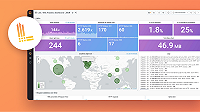Caution
Grafana Agent has reached End-of-Life (EOL) on November 1, 2025. Agent is no longer receiving vendor support and will no longer receive security or bug fixes. Current users of Agent Static mode, Agent Flow mode, and Agent Operator should proceed with migrating to Grafana Alloy. If you have already migrated to Alloy, no further action is required. Read more about why we recommend migrating to Grafana Alloy.
Important: This documentation is about an older version. It's relevant only to the release noted, many of the features and functions have been updated or replaced. Please view the current version.
prometheus.exporter.memcached
The prometheus.exporter.memcached component embeds
memcached_exporter for collecting metrics from a Memcached server.
Usage
prometheus.exporter.memcached "LABEL" {
}Arguments
The following arguments are supported:
Blocks
The prometheus.exporter.memcached component does not support any blocks, and is configured
fully through arguments.
Exported fields
The following fields are exported and can be referenced by other components.
For example, the targets can either be passed to a discovery.relabel
component to rewrite the targets’ label sets, or to a prometheus.scrape
component that collects the exposed metrics.
The exported targets will use the configured in-memory traffic address specified by the run command.
Component health
prometheus.exporter.memcached is only reported as unhealthy if given
an invalid configuration. In those cases, exported fields retain their last
healthy values.
Debug information
prometheus.exporter.memcached does not expose any component-specific
debug information.
Debug metrics
prometheus.exporter.memcached does not expose any component-specific
debug metrics.
Examples
This minimal example uses a prometheus.exporter.memcached component to collect metrics from a Memcached
server running locally, and scrapes the metrics using a prometheus.scrape component:
prometheus.exporter.memcached "example" {
address = "localhost:13321"
timeout = "5s"
}
prometheus.scrape "example" {
targets = [prometheus.exporter.memcached.example.targets]
forward_to = [prometheus.remote_write.default.receiver]
}
prometheus.remote_write "default" {
endpoint {
url = "prometheus.example.com/api/v1/write"
basic_auth {
username = "user"
password = "pass"
}
}
}


